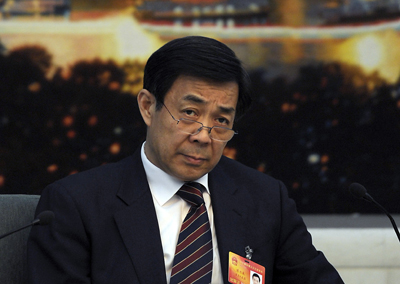The sacking of Chongqing party leader Bo Xilai has sparked some entertaining gossip this month, leaving journalists covering China with the difficult task of reporting on unconfirmed reports. The Chinese government blames the international media, not its own lack of transparency and comprehensive censorship apparatus, for the burgeoning rumors.
Here are some of the juiciest:
- The international connection: “Bo’s longtime aide and Chongqing’s vice mayor, Wang Lijun, fled the city and sought refuge overnight at the United States Consulate in Chengdu. … Rumors have been rife–and unverified–that Mr. Wang presented American officials with evidence of official corruption,” according to The New York Times.
- The blocked coup: “Bloggers circulated alarming reports of tanks entering Beijing and shots being fired in the city as part of what is said to have been a high-level political battle among party leaders–and even a possible military coup” last week, according to The Washington Times.
- The vanishing head of security: “Stories of the removal of spy and police chief Zhou Yongkang are largely based on the absence of his signature on an order last week for cadres in his department to attend an ideological retraining session,” according to The Vancouver Sun in Canada.
- The poisoned Englishman: “Concerned friends and other members of the British community in the south western metropolis of Chongqing fear [Briton Neil Heywood] may have been deliberately poisoned. … Rumors and speculation, fueled by Chinese online whistle blowers, claimed his death is linked to his professional relationship with the Bo family,” according to Britain’s The Daily Mail. Or perhaps there was some other link: “Heywood sometimes did work for Hakluyt and Company, an intensely private London-based strategic advisory firm with close links to the British spy agency, MI6,” the Sun said.
Chinese information officials have played a key role in this mess. Internet censors have been working overtime to delete Chinese-language posts on all of these topics, international news reports and media analysts say. Chinese government spokespeople have been unforthcoming. “I am not aware of this case,” the Foreign Ministry told the Mail when asked about Heywood. But by tamping down the rumors, authorities are feeding speculation that they have something to hide.
In the world of propaganda, however, attack is the best form of defense. The government camp hastened to blame journalists themselves for the information vacuum: “Rumors have been vigorously spreading on the Internet, a few of which even indulge in ludicrous speculations,” the state-run Global Times tutted in an editorial Tuesday. It’s baffling remedy? “Tolerance is still needed over delayed information release in some pivotal fields.” Well, that’s cleared that up, then. “Some media have done reports which are all like jigsaw puzzles, because their information is not complete, and where they’re lacking they rely on their imagination. … So these jigsaws are all incorrect, and even absurd,” another official told a press conference about the Bo Xilai drama, according to The Wall Street Journal website.
Here’s the problem: Journalists and their readers alike know the jigsaw is incorrect. We’re not happy about it either. When you finish a puzzle, you can move onto the next one, but no one will give up on one that’s incomplete. There is a way to deal with rumors, but it’s not censorship. It’s time for the government to release the rest of the pieces.
